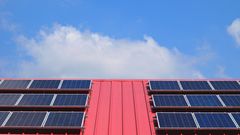Life cycle assessment shows: Households participating in virtual pools of photovoltaic storage systems contribute to environmental and climate protection
Large fossil-fuel power plants still stabilize the power system in the event of fluctuations in the energy supply due to fluctuating power generation from wind and solar plants. But there are increasingly renewable replacements: More and more German households have their own photovoltaic system with battery storage. If these storage systems are virtually connected with each other using digital information and communication technologies (ICT), they can take over such stabilizing services for the energy system. The Institute for Ecological Economy Research (IÖW) has now conducted a detailed life cycle assessment to evaluate the environmental effects of such virtual pools. The conclusion: there are major benefits for climate protection and the environment as a whole. With the predicted further expansion of photovoltaic storage systems, pooling them should therefore also increase, the researchers recommend.
Virtual battery energy storage systems support transition to energy system with a high share of renewables
More and more consumers are supplying themselves with electricity from a photovoltaic system; they are becoming so-called prosumers. If these households are equipped with an additional storage system, excess renewable energy from the power grid can be temporarily stored in their storage system and released at a later time to stabilize the grid. In this way, virtual pools support the transition to an energy system with a high proportion of renewable energy that fluctuates due to weather and climate conditions. The combination of distributed renewables and digital technologies thus offers the potential to stabilize the power supply.
"In 2020, there was about 1.3 gigawatts of photovoltaic battery storage capacity in Germany. Only a fraction of this rated power is part of a virtual pool so far. Transmission system operators and the German Federal Network Agency are assuming an enormous expansion and expect a storage capacity of around 100 gigawatts by 2045," explains study author Hannes Bluhm of the IÖW. "So, there is an enormous storage expansion ahead, which should be used for virtual battery energy storages pools. The stability and security of the energy system would benefit from this."
Holistic environmental assessment of virtual storage systems
Although the concept is environmentally motivated, a holistic environmental assessment that considers both the environmental benefits and burdens of such virtual pools has been lacking. In the Journal of Energy Storage, Hannes Bluhm and Dr Swantje Gährs, IÖW researchers in the BMBF's SteuerBoard Energie junior research group, compare a photovoltaic battery storage system in a German single-family home with and without participation in a virtual pool. They use life cycle assessment to evaluate three levels of environmental effects: direct effects from digitalization such as data transfer and ICT resources, indirect effects from external optimization at the household level such as changes in battery life and power supply, and enablement effects that arise at the system level such as a provision of frequency containment reserve, redispatch, and prevention of renewable energy curtailment.
It can be seen that a prosumer household could have saved up to 656 kg of CO2 equivalents by participating in a virtual battery energy storage system during in 2018. Further environmental benefits are shown by a lower fossil resource consumption, and a lower contribution to ozone layer depletion or acidification. A prerequisite for these findings, according to the authors of the journal article, is that the battery life and the degree of self-sufficiency of the household are not significantly affected by participation in the pool - a common concern of storage owners that has not been confirmed at all or only to a very limited extent in real-life operation.
Battery owners should be encouraged to participate in virtual pools
Current and future battery owners should therefore not be hesitant to allow external access to their storage facilities. In order to make good use of the benefits of such virtual batter pools for the energy system, the rollout of smart meters and smart meter gateways, as the necessary digital metering and communication systems, should also be implemented in the near future.
~~~~~~~~~~~~
Bibliographic information:
Hannes Bluhm, Swantje Gährs (2023): Environmental assessment of prosumer digitalization: The case of virtual pooling of PV battery storage systems, Journal of Energy Storage, Volume 59, 106487, ISSN 2352-152X, https://doi.org/10.1016/j.est.2022.106487



